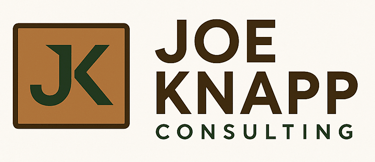Hiring the Right People for Your Small Business
Hiring the right team can make or break your small business—especially in a fast-changing world. In this post, I share my 25+ years of insights on spotting folks with a "learning attitude" (what experts call a growth mindset) who adapt, innovate, and help your operation thrive. Learn to spot warning signs like blame-shifting or resistance to feedback, and green lights like owning mistakes and embracing challenges. I'll walk you through simple steps to update job ads, ask better interview questions, and build a learning culture from day one. If you're tired of hires that stall your growth, this is your guide to building a resilient team.
TEAM BUILDINGSMALL BUSINESS GROWTHPRACTICAL BUSINESS TIPS
Joe Knapp
7/29/20256 min read


Hiring the Right People for Your Small Business: Spotting and Bringing On Folks Who Love to Learn and Grow
Hey there! First off, a quick note: I'm not an HR expert, and I deeply respect the pros who handle hiring every day. There are parts of the process I don't fully understand, like all the rules and balances involved. But in my time helping small businesses like yours, I've noticed something big often gets missed: the way people think about learning and improving. It makes a huge difference in whether a business stays stuck or really takes off.
Picture this: You're running your local shop or service business, and things are changing fast. Maybe new competition pops up, or customer needs shift. You have a team, but some folks wait for you to tell them every step, while others jump in, try new ideas, and learn from what doesn't work. In my 25+ years working in tech and now advising small town businesses, from retail to event planning, I've seen teams sink or soar based on who you hire. It's not just about skills; it's about bringing in people who see challenges as chances to grow. As a small business owner, you're often the one handling hiring, so you're key to building a team that doesn't just get by but truly thrives. Today, let's talk about how to spot folks with that learning attitude during hiring and how to get them started strong. I'll share stories from my experience, mistakes I've made, and simple steps you can try. If you're looking to build a team that rolls with changes and helps your business grow, this is for you. Let's make hiring feel less like a gamble and more like a smart move.
What Does a "Learning Attitude" Mean?
Let's keep it simple. A learning attitude, or what psychologist Carol Dweck calls a "growth mindset," is the belief that you can improve through hard work, trying new things, and sticking with it. It's the opposite of thinking, "I'm just not cut out for that." In a small business, where you need to adapt to things like supply issues or new customer trends, this attitude is a superpower. It turns tough spots into lessons and keeps everyone moving forward.
In my experience, teams with this attitude embrace trying things. Think of an employee who messes up an order but says, "Okay, what can I do differently next time?" instead of "That's not my job." This isn't just for frontline staff; it's crucial for managers or leads too, so everyone works together.
Why a Learning Attitude Matters in Your Business
Running a small business isn't about fancy tools; it's about how your team works together to handle change. Without people who want to learn, you get finger-pointing when things go wrong, resistance to new ideas, and a business that stalls. I've seen this lead to higher costs, unhappy customers, and owners burning out.
But a team that loves learning? They find fresh ways to do things. I once helped a small business owner who stopped micromanaging and started asking his crew, "What should we try next?" during quick check-ins. That sparked ideas like better inventory tracking, which cut waste significantly. Studies back this up: a McKinsey report found that businesses with a positive, adaptable culture can achieve much better returns by encouraging new ideas and flexibility.
As the owner doing the hiring, if you focus only on years of experience and skip checking for adaptability, you might end up with a team that's set in its ways. In a small business, that can hold you back when things change.
Your Role in Hiring: Making It Work for Your Business
As a small business owner, you're likely handling hires yourself or with a small team, and old habits, like focusing on resumes or who knows who, can get in the way. I've worked with owners in manufacturing and finance who stuck to rigid rules, like promoting based on time served rather than willingness to learn. That can hurt teamwork and make people afraid to speak up about problems.
But when you hire with learning in mind, like bringing in a manager who encourages everyone to try new things, it changes everything. I've seen it turn struggling small operations into smooth ones.
Warning Signs and Good Signs When Hiring
Spotting this attitude isn't hard, but you need to look for it. This applies to everyone, but it's especially important for leads or managers who set the tone for your team. A manager with a learning attitude might encourage cross-training and view slip-ups as group lessons, which builds a stronger business. One without it might hover over every detail, resist changes, and create a blame culture that drags everyone down.
Here's a simple breakdown of warning signs (stuck thinking) versus good signs (learning attitude) I've used when helping owners interview, tailored for small businesses like yours:
Warning Sign: Blames others for past problems (e.g., "My old team messed it up").
Good Sign: Owns mistakes and shares lessons (e.g., "I tried this, it didn't work, but now I know better").
Why It Matters for Your Team: Leaders who admit faults show it's okay for the team to do the same, building trust.
Example: A manager blaming staff for a late delivery versus one saying, "I didn't plan well, let's figure it out together."
Warning Sign: Dodges questions about tough times (e.g., "I've never had issues").
Good Sign: Welcomes uncertainty (e.g., "When things change, I test ideas and adjust").
Why It Matters for Your Team: People okay with not knowing everything help your business pivot, like during busy seasons.
Example: A lead avoiding talk of challenges versus one sharing how they handled a surprise order rush.
Warning Sign: Talks up titles or past jobs (e.g., "I've got this certification").
Good Sign: Shares their learning path (e.g., "I switched roles by picking up new skills").
Why It Matters for Your Team: Focus on growth means they'll help your team build skills, not just rely on what they know.
Example: A hire bragging about credentials versus one explaining how they learned a new tool to improve sales.
Warning Sign: Brushes off feedback (e.g., "I don't need much advice").
Good Sign: Asks for input to improve (e.g., "Tell me how I can get better").
Why It Matters for Your Team: Open leaders create a space where everyone shares ideas, leading to better results.
Example: A manager ignoring suggestions versus one asking, "What can I change next time?"
I've learned the hard way: hiring just for experience once left me with skilled folks who wouldn't adapt, causing delays and frustration. Now, I advise owners to dig deeper, especially for roles that shape the whole team.
Simple Steps to Hire and Start Strong
Here are practical tips I've used with small business owners. Start small, adjust as you go, and involve your current team if possible:
Update Job Ads: Skip long lists of requirements and add traits like, "We're looking for curious folks who enjoy solving problems in a changing world."
Ask the Right Interview Questions: Ask for stories, like, "Tell me about a time you tried something new and it didn't go well. What did you learn?" or "How do you handle unexpected changes?" Try role-playing a common business scenario to see how they adapt.
Learn to Spot It: If you're new to this, read up or talk with mentors about what works. It helps you pick people who fit your business vibe.
Start Them Right: Pair new hires with a buddy from day one and hold quick check-ins to discuss what's working and what to tweak. In small setups, this gets them contributing fast.
Rethink Performance Reviews: Move from yearly reviews to regular chats. Reward efforts like trying a new sales approach, not just daily tasks.
Measure What Matters: Notice how new hires handle unknowns versus needing everything spelled out. Gather team feedback or use simple surveys after a month. Faster task times can show if it's working.
Build a Learning Culture from Day One: Share stories of "smart tries that didn't work" during welcome chats. Celebrate lessons learned in team meetings to make it normal.
These steps have worked for me with small service and retail businesses, where quick adjustments make a big difference.
Tough Spots and How to Handle Them
Hiring isn't always easy. Budgets are tight, and sometimes you overlook warning signs for "key players." I once advised a business where a longtime employee refused to adapt because they "knew it all." The owner let it slide due to their experience, but it hurt team spirit. How do you keep everyone aligned if some get special treatment?
To move forward, focus on attitude starting with your next hire. One CEO I worked with said, "Hire good people first, then figure out their spot." It's like the idea from Good to Great: get the right folks on board before assigning roles. That approach has helped a lot.
In another story, I applied for a role at a well-known manufacturer. The main interview was standard, but the team had me tackle a real task for half a day. It showed how I'd fit right away. To fix mismatched hiring processes, blend questions about attitude with hands-on tests from the start.
Wrapping It Up
Hiring is more than filling a role; it's about building a team that helps your business grow. In my experience, it starts with one person who loves to learn. By looking for that attitude, you create a crew that adapts, generates ideas, and keeps things moving forward.
What's one way you've noticed or encouraged a learning attitude in your team? Maybe a story where a hands-on interview showed someone's flexibility, or a time a manager's approach changed the vibe. I'd love to hear your thoughts and maybe pick up a new tip! What's one thing you'll try next in your hiring?
Joe Knapp Consulting, LLC
Waste Less, Profit More
© 2025 Joe Knapp Consulting, LLC. All rights reserved. | Privacy Policy
How I Help
Save Time with automation and smarter tools
Reduce Costs by cutting waste and complexity
Increase Profits through efficient, tech-driven growth
The Socials
Helping small businesses simplify technology and grow with confidence.
